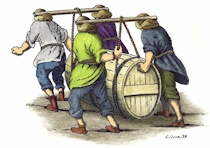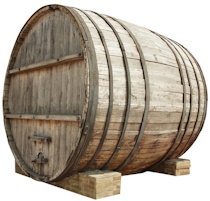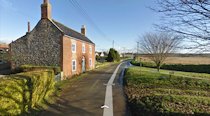The Tunns, at the end of Thursford Road, Great Snoring was closed by 1957, and is now a private dwelling. It was closed on 11.02.1957 when the licence was transferred to the ODDFELLOWS ARMS, Swaffham.
The Tuns, or "The Three Tuns" was named for the Old English word "tun", meaning a barrel or keg of beer. (See  illustration above and right.)
illustration above and right.)
Online it's reported that Emma Elizabeth LAMBERT formerly GREEN nee
PEGG was landlady of the Three Tuns in Gt. Snoring until the early
1950's. Her second husband's name may have been Robert John LAMBERT since he is licensee from 1916 according to www.norfolkpubs.co.uk although he might have been Emma's father-in-law. Emma took over as
licensee in 1941. Her first husband was George GREEN.
Interesting, a much earlier Three Tuns Tavern was located in Philadelphia, Pennsylvania which served as a founding or early meeting place for a number of notable groups. It is traditionally regarded as the site where the United States Marine Corps held its first recruitment drive. It is also thought to be the "birthplace of Masonic teachings in America". Samuel Carpenter and his brother Joshua erected the tavern in 1685 at the intersection of King (later called Water) Street and Tun Alley.
My Association with The Tuns
My own family, the SOUTHGATEs lived next door to the Three Tuns at that time. In the family photo alongside you can see the pub still with its signboard hanging outside, as a working establishment. It must have been handy for my Grandfather and his sons!
You will see below that yet another family member, Robert Southgate took over the Three Tuns in 1861, and his wife Elizabeth continued to run it after his death in July of that year. (Elizabeth was born Eliza Bainbridge in Boston, Norfolk.) Robert was also a "coachbuilder" like other members of his family. He collapsed and died suddenly while getting out of bed one morning.
A
coachbuilder is a manufacturer of horse-drawn vehicles, and now bodies for automobiles.
In a tradition which predates the internal combustion engine by several hundred years, a 'coachbuilder' took delivery of a wheeled chassis without a body, and worked his artistry for the pleasure of a few customers who appreciated, and could afford, a completely bespoke conveyance, or an expression of the particular artistic vision of that builder. When motorized 'coaches' arrived, some of the same carriage builders worked their magic on the chassis of a Cadillac or Rolls Royce, making an already fine automobile just that bit more special.
The Three Tuns today is a substantial private house.
Curious Death at the Tuns
It is recorded that a man by the name of Meshach Story of Wymondham, Norfolk committed suicide while staying at the Tuns. He was a man of about 50 years old, and he killed himself by hanging in the hay loft on June 8th 1885. The was a Coroner's Inquest: Verdict - Temporary Insanity.


 illustration above and right.)
illustration above and right.)






